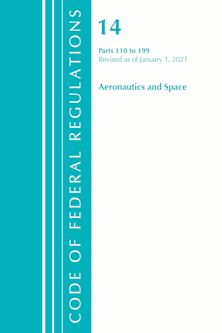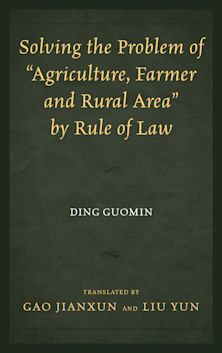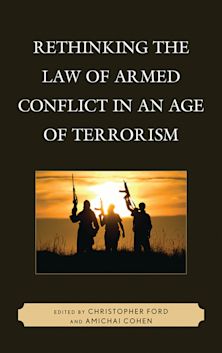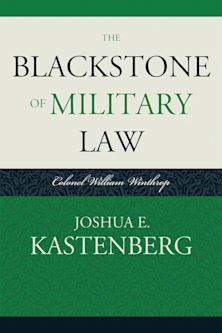- Home
- ACADEMIC
- Law
- Law - Other
- Tribal Criminal Law and Procedure
Please note that this product is not available for purchase from Bloomsbury websites.
You must sign in to add this item to your wishlist. Please sign in or create an account
Description
Tribal Criminal Law and Procedure is the second in a unique series of comprehensive studies of tribal law in the United States. This book examines the complex subject of tribal criminal law and procedure from a tribal perspective_utilizing tribal statutory law, tribal case law, and the cultural values of Native peoples. Garrow and Deer discuss in depth the histories, structures and practices of tribal justice systems, comparisons of traditional tribal justice with Anglo-American law and jurisdictions, elements of criminal law and procedure, and alternative sentencing and traditional sanctions. Tribal Criminal Law and Procedure will be an invaluable resource for legal scholars and students. Published in cooperation with the Tribal Law and Policy Institute, visit their web page; Turtle Mountain Community College; and the Native Nations Law and Policy Center, University of California, Los Angeles.
Table of Contents
Part 3 Preface: Tribal Legal Studies Textbook Series Introduction
Part 4 Notes on Terminology
Part 5 Acknowledgments
Part 6 Credits
Part 7 PART I. Criminal Law in Anglo-American and Native Societies
Chapter 8 Chapter 1. Introduction to Criminal Law Concepts
Chapter 9 Chapter 2. Comparing Traditional Criminal Law to Anglo-American Criminal Law
Chapter 10 Chapter 3. Using Western Criminal Law to Control Native American Nations
Chapter 11 Chapter 4: Traditional Law Today
Part 12 PART II. Criminal Jurisdiction in Indian Country
Chapter 13 Chapter 5. Introduction-What is Criminal Jurisdiction?
Chapter 14 Chapter 6. Traditional Criminal Jurisdiction in Indian Country
Chapter 15 Chapter 7. Limitations on Tribal Criminal Jurisdiction Imposed by the United States
Chapter 16 Chapter 8. Efforts by Tribal Nations to Address Jurisdictional Gaps
Chapter 17 Chapter 9. Criminal Jurisdiction as Defined by Tribal Courts
Part 18 Part III. Criminal Law: Elements of a Crime and Defenses
Chapter 19 Chapter 10. Introduction to Elements and Acts
Chapter 20 Chapter 11. The Mental State
Chapter 21 Chapter 12. A Closer Look at Criminal Elements
Chapter 22 Chapter 13. Is Helping a Criminal Act? Preliminary Crimes and Accomplice Liability
Chapter 23 Chapter 14. Criminal Defenses
Chapter 24 Chapter 15. The Burden of Proof
Part 25 Part IV. Criminal Procedure
Chapter 26 Chapter 16. Rights of Criminal Defendants and Crime Victims
Chapter 27 Chapter 17. The Law of Arrest
Chapter 28 Chapter 18. Interrogations and Confessions: The Right to Remain Silent
Chapter 29 Chapter 19: Search and Seizure
Chapter 30 Chapter 20: The Exclusionary Rule: Remedies for Civil Rights Violations
Chapter 31 Chapter 21. The Right to an Attorney/Advocate
Chapter 32 Chapter 22: Defendant Rights at Trial
Chapter 33 Chapter 23: Victims' Rights in Criminal Procedure
Part 34 Part V. Sanctions and Sentencing
Chapter 35 Chapter 24: Sentencing: Fines and Incarceration
Part 36 Glossary
Chapter 36 Chapter 25: Alternative Sentences and Traditional Sanctions
Part 37 Index
Part 38 About the Authors
Product details
| Published | Oct 22 2004 |
|---|---|
| Format | Paperback |
| Edition | 1st |
| Extent | 454 |
| ISBN | 9780759107182 |
| Imprint | AltaMira Press |
| Dimensions | 228 x 168 mm |
| Series | Tribal Legal Studies |
| Publisher | Bloomsbury Publishing |
About the contributors
Reviews
-
This text will be what students call a keeper, one that goes in the personal library after the course is over. Carrie E. Garrow and Sarah Deer have done for tribal criminal justice what Vine Deloria, Jr. did for tribal religion in God is Red. They have generalized a subject that is nearly impossible to generalize. They draw straight lines from tribal custom to common law as justice-defining institutions.
Steve Russell, Indiana University, citizen of the Cherokee Nation
-
I'm impressed with the background and history explaining the evolution of the justice systems and the mire of jurisdictional barriers that abound in Indian country. The reluctance to accept a foreign system in lieu of a traditional system is explained. I recommend this book for education and training of tribal justice practitioners and individuals interested in understanding Tribal governments.
Edward Reina, Jr., Yavapai-Prescott Tribal Police, Arizona
-
This book is a comprehensive approach to the subject matter. The authors include traditional stories, excerpts from scholarly work, and briefs or transcripts from actual legal cases. These materials will aid students, practitioners, and scholars in the application of native trial law to practical concerns they encounter on a daily basis. The examples are well-chosen, and important terms are clearly defined. End of chapter questions should stimulate debate and deepen the reader's awareness of the material that is presented. In short, the book is a major contribution to understanding the contextualization and application of native tribal law.
Jeffrey Ian Ross, University of Baltimore
-
Finally, a book examining the complex subject of criminal law and jurisdiction on Indian reservations from a tribal perspective, utilizing the decisions of tribal judges and borrowing from the cultural values of native persons. A comprehensive review of criminal law jurisdiction in Indian country that does not merely rehash the decisions from Anglo courts that touch on Indian issues merely in passing, Tribal Criminal Law and Procedure instead assesses the purpose of law and justice systems in Indian communities based upon the diverse mores and values of native peoples. This book would be an outstanding contribution to the study of criminal law and jurisdiction in Indian country in both tribal community colleges and other universities.
B. J. Jones, Northern Plains Tribal Judicial Institute, University of North Dakota School of Law
-
Since the first European stepped onto this continent, tribal sovereignty and tribal judicial systems have faced many challenges. Tribal Criminal Law and Procedure, a comprehensive survey of substantive and procedural criminal law governing tribal judicial systems, is designed to increase the practitioners understanding of these problems and the unique opportunities inherent in tribal judicial systems. It carefully examines tribal judicial systems drawing upon actual tribal court decisions as Indian Nations strive to achieve justice reflecting their own unique fundamental traditional values. This book, written for the learned as well as the lay person, is certainly a worthy investment. As you read it, the reader becomes fully aware of the importance of tribal sovereignty and the importance of developing tribal judicial systems.
Donovan D. Brown, Sr., Navajo Nation Department of Justice
-
With hundreds of tribal criminal justice systems applying tribal law in order to build community and promote justice in the Indian Nations, this book is long overdue. It is a carefully thought out and imaginatively presented casebook, incorporating legal, historical, and anthropological materials. Particularly important is that it puts tribal criminal law cases at the center of its organization. It is great reading, truly a tribute to the thousands of tribal criminal law officials whose work is represented in the cases.
Sidney L. Harring, School of Law at Queens College, CUNY


































